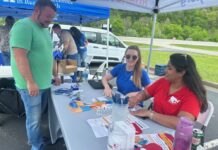
Each year, the joy of the Derby is marred by the knowledge that such large high-profile events can result in increased instances of sex trafficking.
Naomi Warnick, a pediatric emergency medicine fellow at UofL, suggests members of the public keep an eye out for any suspicious activity. If you suspect you have encountered someone who is being trafficked, report it by calling the national human trafficking hotline at 1-888-373-7888. Law enforcement also can be notified.
While it can occur more during the Derby, Olivia Mittel, associate dean for medical student affairs in the UofL School of Medicine, said sex trafficking happens everywhere and at all times, and judgment should be used when making contact with anyone potentially involved in the situation.
“I think it’s important for people to become familiar with the various aspects of trafficking and recognize that many people are at risk, there’s not just one way. Asking the question ‘is anyone asking you to do something you don’t want to do?’ is one way to gauge whether someone is at risk.”
Warnick and Mittel are developing educational content for health care providers to help them recognize human trafficking and provide care for those who are trafficked or at risk of being trafficked. The project specifically relates to trauma informed communication with those who are affected by trafficking.
Melissa Currie is Kosair Charities Professor and Endowed Chair for Pediatric Forensic Medicine and chief of the Kosair Charities Division of Pediatric Forensic Medicine and stresses that the public should remember children can be victims of sex trafficking too.
“The average age of entry into trafficking in the United States is 13 years old. It can involve the child being advertised, solicited or otherwise exploited for commercial sex acts. The exchange can involve money, drugs, food, attention or housing—particularly in children who have run away from home—in return for sex acts.”
Children won’t necessarily recognize that they are being used and exploited, Currie said.
“Victims often don’t recognize that they’re being victimized and may identify their trafficker as a romantic partner. This is a complex crime that targets our most vulnerable children.”

























